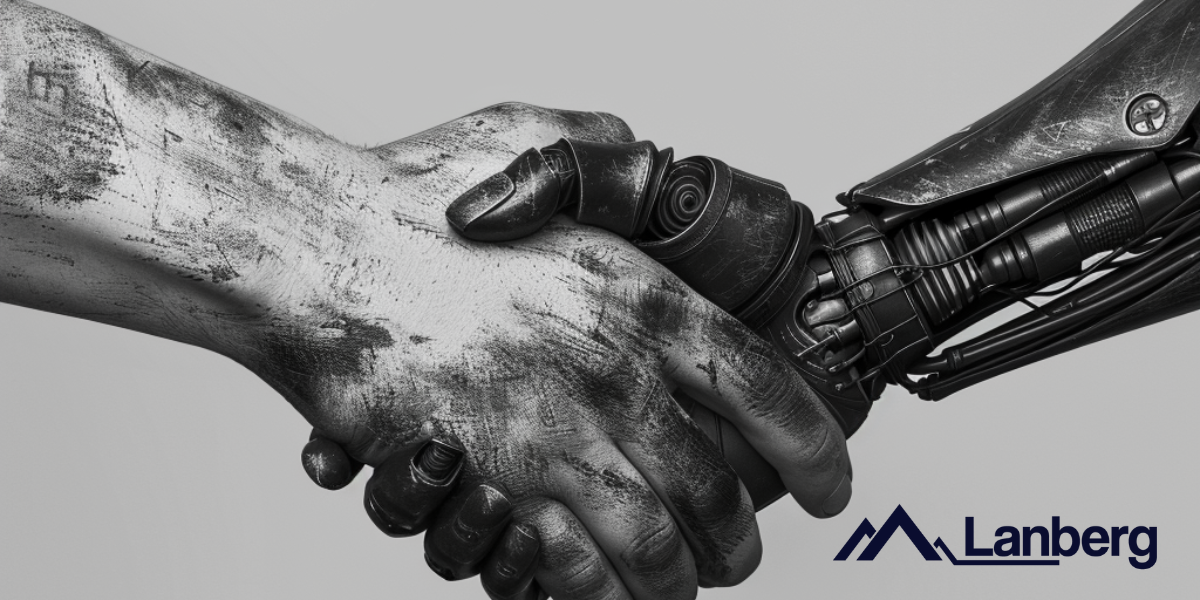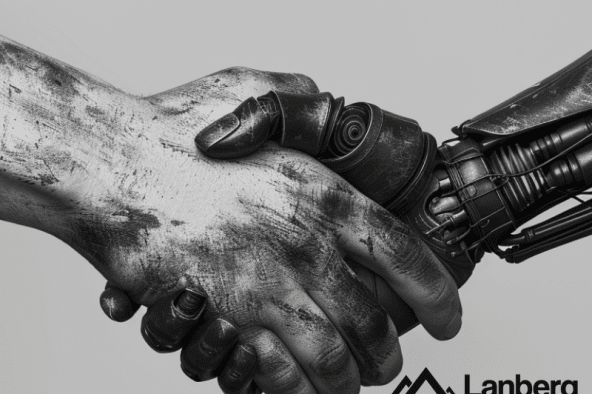Decalogue of AI -10 rules for working with artificial intelligence

1 Take a step back
Solutions using artificial intelligence have been with us for many years. Recently, however, interest in them has increased - mainly due to the prevalence of large-scale language models (of the ChatGPT type). However, it is worth looking first at what artificial intelligence actually is and how it has been used in our lives so far.
------------------
We have been in contact with AI for a long time, even though we probably didn't realize it. Recently, there has been an increased interest in the subject - probably because we can suddenly have a conversation with artificial intelligence that resembles a conversation with a real person. And yet, this works on our imagination. But is this more than just a temporary trend?
Artificial intelligence has already occurred in many facets of our lives. At the end of the day, it's really mathematical equations operating on the basis of a provided database. We've been exposed to it before - for example, using smart appliances in our homes (air conditioners, vacuum cleaners, watches) or using search engine prompts and personalized shopping recommendations in online stores. We live with it every day, so the increased interest now should not be seen as a trend, but as another step in the development of this technology. So maybe it's not a revolution but an evolution after all - and we didn't realize it?

2 Broaden your horizons
Artificial intelligence is not just ChatGPT. Creating graphics, generating voice, animation or data analysis. The number of solutions is vast and worth exploring. The multitude of applications we can use it for - and what will be possible with its help in the future - is both disturbing and exciting.
------------------
The field will develop rapidly in the next few years. Therefore, in order not to be left behind, it is already worth learning about the tools that are being developed using artificial intelligence.
We can already find a great number of them on the market. It is important not to focus solely on one aspect of AI, but also to appreciate its diversity and potential. For example, exploring technologies based on machine learning can open up opportunities related to the optimization of business processes, precision medicine or environmental protection.In the long term, awareness of the diversity of AI applications will allow us to better understand its evolution and the ability to adapt to technological changes in the future.

3 Collaborate
Instead of thinking about the moment when artificial intelligence will replace us at work, use it to help us. AI is able to analyze huge amounts of data much more efficiently than humans. It also allows us to automate some parts of our work and get rid of simple but boring and repetitive tasks. Throw in optimization, and you have a great assistant.
------------------
And maybe this is how we should approach it? Let him advise, not manage - so as not to scare away customers and employees.
Personally, I treat him a bit like an extra employee in the company. Someone who will quickly do a job that may be boring and repetitive for most. After all, sooner or later a person with such responsibilities will start looking for other professional challenges.
To identify more with such a virtual employee try to give him a specific name, define his responsibilities and plan the work he is to do.
Our virtual employee is called C-Berg and has his own visual avatar (also created by AI). We know exactly when we should use him and in which tasks he will help us most effectively.

4 Teach
The world does not stand still, but rushes forward, so it is important to constantly develop our skills. In this particular case, we both need to learn how to use the new tools, as well as to set a goal and indicators for them, and then provide the appropriate data to achieve them.
For best results, we need to teach AI to our organization, brand or strategy. Of course, to a certain extent (it all depends on the company's chosen policy), while if we were to treat the tools as a "virtual employee", it is worth thinking about how to implement it into our business. Acting on the example of ChatGPT - by letting it get to know us, it will be easier for it to create content and data that is personalized for our business or brand. If we don't know how to do this, I recommend starting with simple things - learning the name of the person they are talking to, how they should introduce themselves and address us. Explaining where he works from now on and what he will be doing. After a few contacts, ideas will come up on their own.
(At the beginning of the ChatGPT adventure, it's a good idea to stick to the history of the same conversation all the time in order to learn the behavior and data he is supposed to operate on!)
Learning applies to both the algorithms and the worker. In the future, a very desirable and important skill at work will be the creation of so-called prompts. This is the formulation of appropriate questions in order to get the best answers. This applies to tools like "Analyze Data" in Excel or commands to create graphics in Midjourney. Anyone could ask you to generate an image of a cat, but knowing what changes the commands stylize, aspect ratios, quality, or uplight cause allows you to achieve the most unique and interesting results.

5. get inspired
Not all of us are creative people. Sometimes we have a blank in our heads or are tired of reinventing the wheel. Instead of breaking our hands or postponing projects, it's worth taking advantage of AI tools that can support us, inspire us or visualize ideas.
------------------
AI can be a support on many levels, and often we are only limited in their applications by our imagination. They are a great motivator and inspirer for work. Such as when we think about designing a poster, adding a background in a photo or filling a page design with content other than "Lorem Ipsum." This can be the start of a great idea that we will want to develop in the future.

6. rest
Fatigue, creative block, stagnation. All of these cause us to have bad emotions, and often professional burnout. With AI, we can reduce tedious, repetitive work and thus give ourselves more time for human interaction or rest.
------------------
Sometimes it is more important than doing the same thing for the nth time to stop and think about whether a thing can be done differently or better.
The time we can save is capable of providing more benefits than we realize. Both mental and business benefits.
Using AI to automate tedious, repetitive tasks can not only bring efficiency benefits, but also help with sustainability.

7 Welcome change
"With the fourth industrial revolution taking off before our eyes, learning computers will drastically change our lives. More than the wheel, electricity or the Internet."
Jen Hsun Huang, head of Nvidia
Every change is difficult and can be scary. However, most of them are something good for us and affect our development. Sometimes they are beyond our control, and that is the case here.
------------------
Many influential people in the Tech industry talk about Artificial Intelligence as something that will change life once and for all, but the vast majority describe concern about this stage of development. It's worth pondering how big a threat this could be and asking questions about whether it's developing in the right direction. In fact, we should even be discussing it! The question, however, is whether these doubts should not be raised on a massive scale much earlier?
AI is a mathematical equation that works on data and would not have the right to work without it. It is we, as mankind, who decided to collect them and gather them in huge quantities, in order to later teach machines to collect them for us (Machine Learning, Deep Learning). Before that, we should have already begun to discuss whether this is definitely the right direction. But data is often the most important business value, so it will be hard to stop now. And the natural direction of development when having such an amount of material was to flip their analysis to the computer, since a human can't handle this task, in a reasonable period of time.
So if business - and we as consumers, using AI on a daily basis (point 1), have already become accustomed to an easier life thanks to technologies and have thus given tacit approval to their use, why should we now fear visions of a future apocalypse-like crisis?
With the current development of technology, it's hard to even predict what our world will look like in 5 or 10 years. Certainly in the long run many professions will have to transform a bit, but at this point it is not easy to assess the exact direction.
- Will there be as much need for drivers a decade from now if autonomous cars accelerate their development?
- Will data analysts be needed when, without much knowledge, we can pull up data of interest using AI?
- Will labs without AI support make sense to exist?
- And what about when quantum computers come into commercial use?
As individuals, we can't stop it, though I don't know how much we'd like to, so it's time to accept and welcome this change in order to gain experience in learning new tools for future work as soon as possible.

8 Inform
Set yourself a boundary on Informing the fact of using artificial intelligence tools in communication with another person and try not to cross it.
------------------
I believe that it is extremely important for maintaining a healthy interpersonal relationship to inform the recipient of the message about the fact of using content created by AI. Of course, I am not referring to the use of text or graphics for generally created forms like product descriptions, charts for reports, catalogs, etc. In this particular case, I'm talking about direct contact with another human being (or a specific group of people).
Example text or speech generators can be the first line of support needed to verify a specific topic of conversation, before switching to the appropriate consultant. After all, this has been in operation for some time. The more technology advances, the harder it will be to sense the difference between whether we are talking to a human or a machine. Therefore, it is extremely important to know who our caller is, and we should always have this information in such cases.
Similarly, in the case of contacting each other on social networks, through emails or instant messaging. I would like to know whether the messages I receive are written by a live person whom I can get to know in the future and establish some kind of relationship, or whether, however, it is just a predefined script and a real person will join only from a certain point in the conversation.
Of course, I realize that this will still be used in ways that contradict this approach. Already, undergraduate papers, blog articles or deep fake videos are often unsigned or credit is given to someone who only created the right "prompt."
If we don't want to lose ourselves in what we are so afraid of in this technology, we should be responsible for what our work and thoughts are. On the other hand, where have we supported ourselves with AI (also ok), and at what point is it artificial intelligence that has done everything for us and we take credit for it?

9 Check
AI learns based on the patterns it manages to extract from a huge amount of data. It is therefore not flawless, and these patterns can be inaccurate. That's why, when assisting with papers written by AI, it's a good idea to ask it about the sources of the information from which it prepared our answer and check their reliability yourself.
------------------
Artificial intelligence can be a great support for us in our work and daily life, but in the wrong hands it can also become a great tool in troll farms and spreading fake news. With the development of more tools, we can't be sure that the information given to us are common facts and it creates answers based on them. It is enough to fill AI with biased data, the kind of data we want it to spread, despite questionable facts. It is necessary to pay close attention to this and assess the credibility of the information ourselves. When we are not sure about something, it is worth double-checking - ask for the source of the information, check it yourself and draw conclusions.
This is especially dangerous, because the source to which it will be referred might just as well be typewritten, too, and we'll get a little wrapped up in misinformation. The more time we spend checking in a few places, the more certain we are about its veracity or the legitimacy of its use.

10. have fun
Remember that there is more to life than work. Just as the development of the Web 2.0 version of the Internet has made it easier to work, entertain and develop passions, the same can happen with AI tools - both those already developed and those that will emerge in the future.
------------------
The first thing that may come to mind is the gaming industry. Through their optimizations, for example, creating more interesting interactions with NPC characters, more interesting side quests.
Other technological trends are also developing, such as Metavers, where it will be easier and faster to populate them with content.
We will be able to create board games ourselves (whether game rules or graphics for them), enhance our vacation photos, create videos or support ourselves with technology to create designs for our own furniture.
Perhaps we would like to create personalized family heirlooms for loved ones. Or maybe we'll need a teacher for tutoring, but we live far from larger towns.
It's hard to predict what the future holds. In this case, however, we are limited only by our imagination, because we will get really a lot of possibilities.
Although it will be a little easier with this imagination too, when we ask for AI support 😉 .
Want more interesting articles on technology?
Subscribe to our newsletter and watch our social networks and you won't miss a thing.







